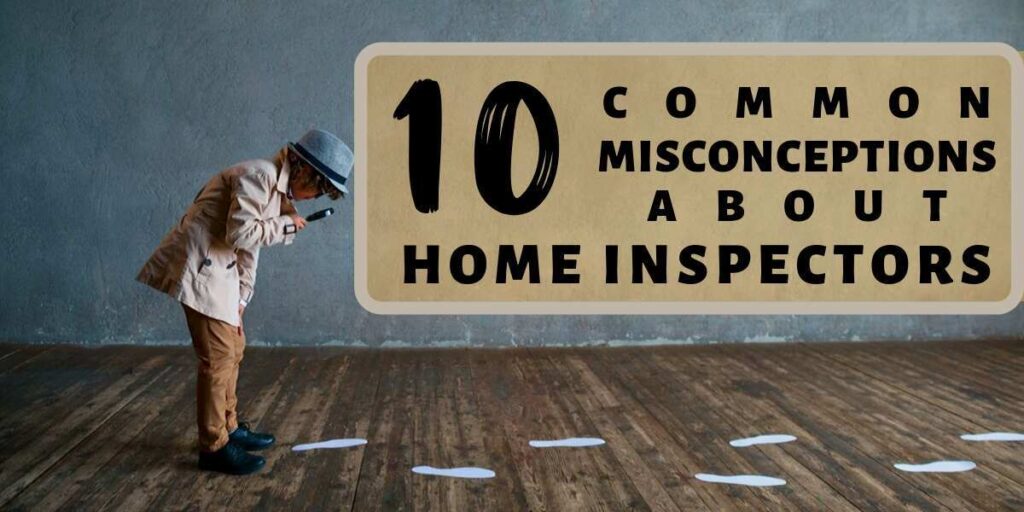- Home Inspectors will give you an estimated value for your house – Inspectors are commonly mixed up with appraisers. An inspector looks at the function of the primary systems of a house. We will ensure things like plumbing and electricity are working and that the structure of the house is performing as intended. Inspectors also look for signs of past water intrusion and check the exterior building components like your roof and siding. Appraisers, on the other hand, look at a house on behalf of a lender to be sure the house has the value that they are extending a loan to a buyer for.
- Home inspectors look for mold – Home inspectors in most areas work under a set of standards of practice (commonly referred to as “SOPs”). These SOPs are essentially rules and guidelines as to what is and what is not looked for and reported on in a home inspection. Every set of SOPs I’ve seen specifically excludes inspecting for mold. There are companies that specialize in mold inspection and remediation but this is different than a standard home inspection.
- Home inspectors inspect for lead paint and asbestos – Similar to mold, lead paint and asbestos are environmental hazards and they are not included in a standard home inspection. It’s worth noting that both lead paint and asbestos were common in houses build before 1980 and both will often be found houses built before that time.
- Home inspectors will find every problem in a house – Even the most educated, best trained home inspector can’t possibly find all of the problems in a house. There are things that occur seasonally, problems that only occur under a certain conditions and things that are outside the scope of our work as home inspectors. People that hire home inspectors should go into the process with realistic expectations. Home ownership is great but there is inherently a given amount of risk and responsibility.
- Home inspectors will find hidden or concealed problems – As home inspectors we don’t have the luxury of tearing a house apart to find problems. Nor do we have magical X-ray vision to see into walls. Damage from past leaks and construction defects can often exist in places that would require dismantling of the house in order to discover them. Also, belongings of the current occupant of the house constitute another barrier. Furniture and other stored items can conceal problems in a house that cannot be found and are not reported on by a home inspector.
- Home inspectors inspect a house for code compliance – It’s common in most cities to find houses built over a time span of well over 100 years. During that time, methods and “codes” regularly changed. It’s just not realistic to expect a single home inspector to be aware of building codes for all areas of a house during a span of 100+ years. For this reason, building code compliance is specifically excluded from a home inspection according to SOPs.
- Home inspectors all used to be contractors – While many inspectors have worked professionally on houses at some point in the past, there is no requirement that they have any construction experience. In reality, home inspectors come at the profession from a wide array of work experience with many having never swung a hammer or nailed roofs down.
- Home inspectors can be paid to fix things in houses they inspect – Home inspectors are paid to report on defects and problems in a house, usually for potential buyers. Contractors are paid to fix problems in houses. While it may seem convenient for a single person to wear both hats there would be a huge conflict of interest if an inspector could find things and get paid to fix them. For this reason, home inspectors only report problems and cannot bid on or perform repairs.
- Home inspectors will give you prices to repair the problems they find– Anyone who has ever gathered bids to have work done on their house will tell you that the prices are all over the map. You will commonly get a bid by one contractor that is 3X the price another one wants for the same work. To expect a home inspector to jump into the middle of this chaos and give you a price to fix or replace something is just not realistic.
- Home inspectors will inspect everything in and around the house – While a home inspector will look at the major systems in your house, there are some things that are outside the scope of a home inspection. Items such as swimming pools, underground sprinklers, cable TV wiring and property boundaries are not part of a typical home inspection. Understanding what is included in a home inspection is an important part of buying a house. I strongly encourage you to read all of the paperwork related to your inspection and to ask your inspector and real estate agent questions during the process. Inspectors, agents and others involved in your home purchase are there for you. Take advantage our experience and learn all you can during the process.

